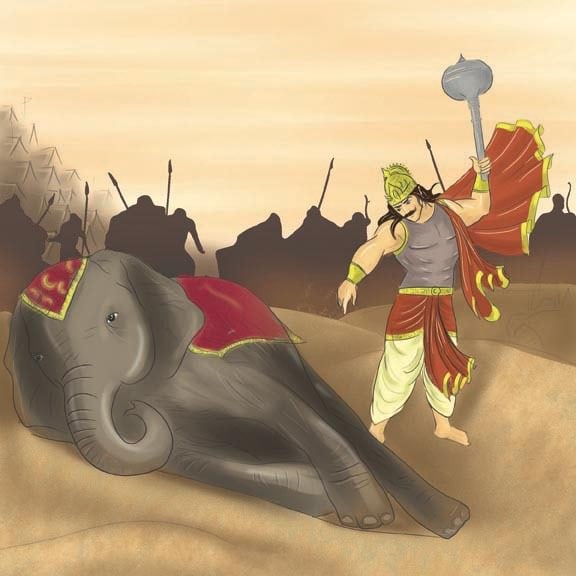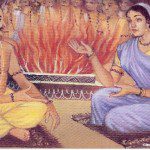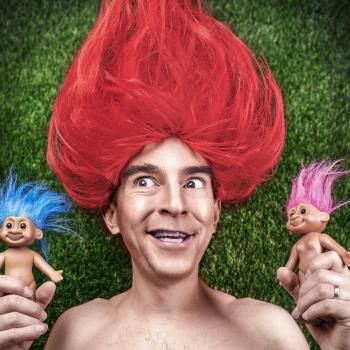In America we have this kooky legend that Elvis is still alive. Even though he died a while ago, people claim to see him at gas stations and out of the way places. There’s some romance to the idea that instead of dying young, he faked a death and is shirking the spotlight.
India has a legend that reminds me a little of that. It involves Ashwathaman from The Mahabharata.
Ashwathaman is the son of Drona, who taught the heros (the Panadva) all they know about being warriors. He also taught their cousins who are now their enemies. Drona is bound by duty to the current kings, though he believes in the Pandavas’ right to the throne.
Despite that he fights valiantly against them. The Pandava know they must defeat him but the only way to defeat Drona in battle is for him to willingly lay down his arms and accept death. How could anyone make him do that?
The Pandava realize that the thing that would dishearten him would be if his son Ashwathaman were to be killed. But he also is very difficult to defeat so instead of actually killing Ashwathaman, one of them kills an elephant that they have named Ashwathaman so that they can tell Drona that “Ashwathaman is dead.”
When the son of Dharma himself tells Drona this, he has to believe it and he lays down his arms in despair.

[One of the themes of The Mahabharata is the way the world is disintigrating. The rules of war that used to be nobly upheld get broken one by one in this story. Though it is a great story with some of the most important moments of Hindu legend, it is also complex and at times disturbing. It takes a lot of time and study to begin to understand dharma within The Mahabharata.]
Ashwathaman is naturally enraged by this lie and his father’s death. He decides that he too will break the rules and do something sneaky. He goes into the Pandavas’ camp during the night and kills nearly everyone, in particular he kills their sons in the hopes of erasing the Pandava lineage.
For this action he is punished directly by Sri Krishna.
Krishna curses Ashwathman that he will not be able to die. He will roam the forests and the outskirts of society with wounds that will not heal (particularly a forehead wound) and no one will show him any hospitality. He will be in total isolation, living alone until the end of the Kali Yuga.
It is said that even now he wanders the earth looking for death and an end to his curse.
The immortals in Hinduism are called Chiranjivi or Chiranjeevis. There are officially seven of them but others are said to also exist. Here is the list from Wikipedia:
- Ashwatthama, the son of Drona, a great warrior. He acted out of cowardice to avenge the killing of his father, resulting in a curse of immortality.
- Bali, also called MahaBali, was the virtuous emperor of the three worlds and grandson of Prahlad who was of Asura descent. Every year on the day of Onam, he descends to earth from the heavens to visit his people, those of the region of Kerala.
- Hanuman, served Rama. He stands for selflessness, courage, devotion, strength, and righteous conduct.
- Kripa, military guru of the princes in the Mahabharata.
- Parashurama, 6th avatar of Vishnu, master of all astras, sastras and divine weapons. The Kalki Purana writes that he will re emerge at end time to be the martial guru of Kalki. He will then instruct the final avatar to undertake penance to receive celestial weaponry, required to save mankind at end time.
- Vibhishana, brother of Ravana. Vibhishana surrendered to Rama before his battle with Ravana. Later, he was crowned king of Lanka after Ravana was killed by Rama. He stands for righteousness. Vibhishana is not a true Chiranjivi, as his boon of longevity is to remain on the earth only until the end of the Mahayuga.
- Vyasa, the sage who composed the Mahabharata. He represents erudition and wisdom. He was the son of sage Parashara and grandson of sage Vashishtha. He was born towards the end of Tretayuga, lived to see the complete Dwaparayuga, and also saw the initial phase of Kalyuga.
Hindu scripture contains a mantra about the seven immortals, in which their names are recited for luck and longevity:
अश्वत्थामाबलिर्व्यासोहनुमांश्च विभीषण:कृपश्चपरशुरामश्च सप्तैतेचिरंजीविन:।
-
-
Ashwathaama Balir Vyasaha Hanumantha Vibeeshanaha
-
Kripa Parashuramascha
-
Saptaitey Chiranjivinaha
-
People report sitings of Ashwathman every now and then. Here is a list of a few from http://www.creatingideasblogs.com/2012/06/24/the-legend-of-ashwathama-is-ashwathama-still-alive/:
*A Vaidya (Ayurvedic Doctor) in Madhya Pradesh had a tough patient with a septic forehead. After several applications of a fail-proof potion, the wound was still fresh and kept bleeding. Amazed at this, the doctor wittingly said: “Your wound seems ageless and cureless. I wonder, are you Ashwathama.. hahaha”. At the third ‘ha’, he turned around to apply the next doze and found that the seat was empty. The patient just disappeared into air, sealing Vaidya’s wit with reality. This was reported in the Kalyan Magazine as well but who know if its a truth or not!!
*Legend says that in an Indian village near Burhanpur, there is an old fort called Asirgarh (in Madhya Pradesh), ancient tomb in India where Ashwathama supposedly offers flowers to a Shivaling each morning. This came very briefly on some news channels too.
*Some Yogis like Pilot Baba mentioned their encounter and conversation with Ashwathama, who was living among tribes at Himalayan Foothills.
Here is the clip of Drona’s death from one of my favorite movies, the Peter Brook version of The Mahabharata (he made an international cast to show how the story of The Mahabharata is the story of all mankind) http://youtu.be/dVgBkfNu7k0?t=53m43s















